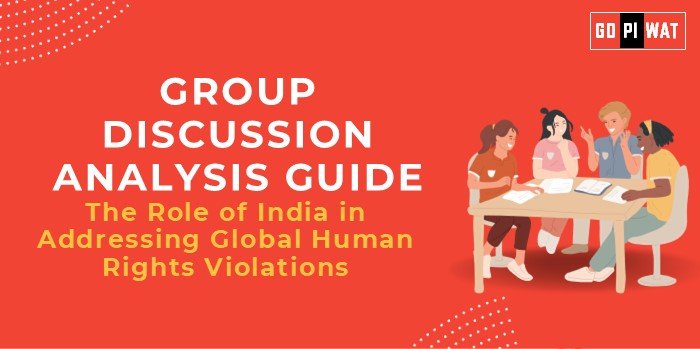📋 Group Discussion (GD) Analysis Guide
🌟 The Role of India in Addressing Global Human Rights Violations
🌐 Introduction
Opening Context: Human rights form the cornerstone of a just society, yet global violations persist. As the world’s largest democracy, India occupies a pivotal position in addressing these issues.
Topic Background: From its history of championing non-alignment to its leadership roles in UN initiatives, India has consistently voiced support for human rights. Recent global conflicts and crises, such as the ongoing Rohingya refugee situation and challenges in Afghanistan, call for India’s continued engagement.
📊 Quick Facts and Key Statistics
- 👮♂️ India’s Global Contributions: As of 2023, India has contributed over 250,000 personnel to UN peacekeeping missions, many focused on human rights protection.
- 📝 Human Rights Advocacy: India supported the Universal Declaration of Human Rights in 1948, cementing its commitment early in international forums.
- 🤝 Humanitarian Aid: Over $3 billion in aid provided to countries in South Asia and Africa for disaster relief and rehabilitation in the past five years.
- 🏠 Refugee Protection: India hosts over 200,000 refugees from neighboring countries, despite not being a signatory to the UN Refugee Convention.
👥 Stakeholders and Their Roles
- 🇮🇳 Indian Government: Drafts and implements foreign policy strategies for human rights advocacy.
- 🌐 International Organizations: Collaborates with entities like the UNHRC to enforce and monitor human rights.
- 🏛️ Civil Society: Drives grassroots awareness and global accountability.
- 🌏 Neighboring Nations: In South Asia, partnerships and tensions impact India’s human rights stance.
🏆 Achievements and Challenges
- 🎯 Achievements:
- Advocated for UN Sustainable Development Goals (SDGs), particularly SDG 16 (peace, justice, strong institutions).
- Successful humanitarian intervention in Sri Lanka and Nepal post-disaster.
- Leadership in initiatives like the International Solar Alliance (linking environmental rights).
- ⚠️ Challenges:
- Balancing non-interference with advocacy (e.g., Myanmar crisis).
- Criticism of domestic human rights record affects credibility globally.
🌍 Global Comparisons
- 🇩🇪 Germany: India’s refugee aid mirrors Germany’s post-Syrian crisis policy.
- 🇨🇳 China: Contradictory role juxtaposes rights advocacy with violations.
Case Studies:
- 📜 Rohingya Crisis: India’s relief efforts, juxtaposed with resistance to asylum.
- 🏴 Afghanistan: Rehabilitation of minority groups post-Taliban resurgence.
📋 Structured Arguments for Discussion
- ✔️ Supporting Stance: “India’s contributions to UN missions and disaster relief underline its proactive role in human rights protection globally.”
- ❌ Opposing Stance: “Domestic human rights concerns hinder India’s credibility as a global advocate.”
- ⚖️ Balanced Perspective: “While India’s global advocacy is commendable, addressing internal challenges can strengthen its position.”
🛠️ Effective Discussion Approaches
- 🔍 Opening Approaches:
- “India’s role in the global human rights domain is critical, with its unique position as a leader among developing nations.”
- “Despite global advocacy, gaps in India’s domestic policies highlight the need for introspection.”
- 💬 Counter-Argument Handling:
- Example: “Criticisms of India’s domestic record can be counterbalanced by its refugee rehabilitation programs and disaster relief efforts.”
📈 Strategic Analysis (SWOT)
- 🟢 Strengths: History of non-alignment; robust global partnerships.
- 🟡 Weaknesses: Domestic controversies weaken global advocacy.
- 🔵 Opportunities: Leadership in multilateral forums like UNHRC.
- 🔴 Threats: Regional conflicts, geopolitical rivalries.
📚 Connecting with B-School Applications
- 🌏 Real-World Applications:
- Exploring public-private partnerships in humanitarian relief.
- Studying geopolitical impacts on business ethics.
- 🤔 Sample Questions:
- “What role can India play in UN-led human rights initiatives?”
- “How do domestic human rights issues influence international diplomacy?”
- 💡 Insights for Students:
- Analyzing the nexus between human rights and sustainable development.
- Investigating CSR in conflict-affected regions.


